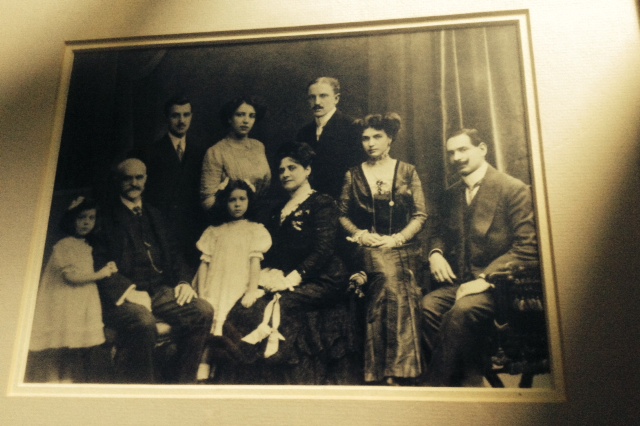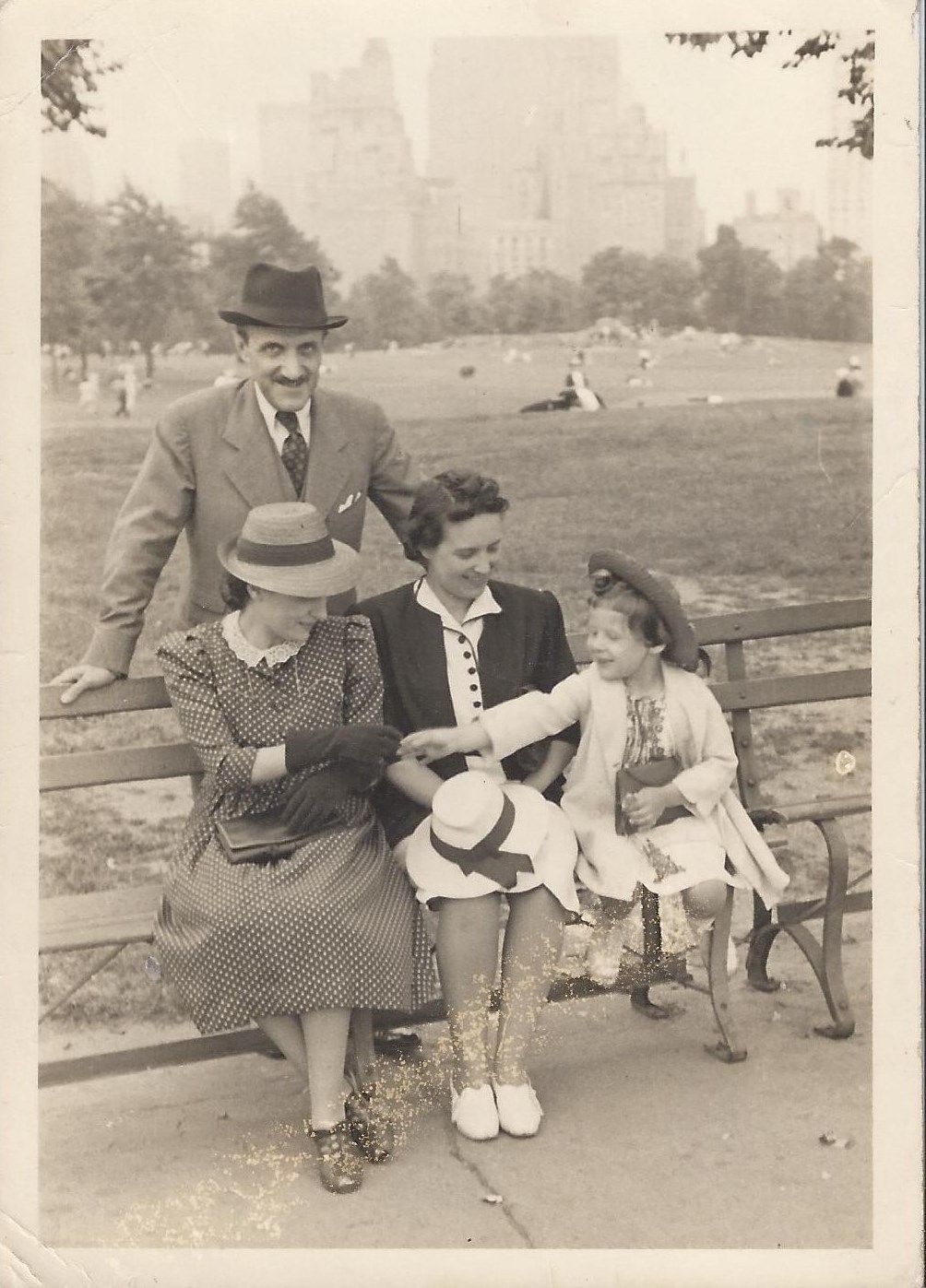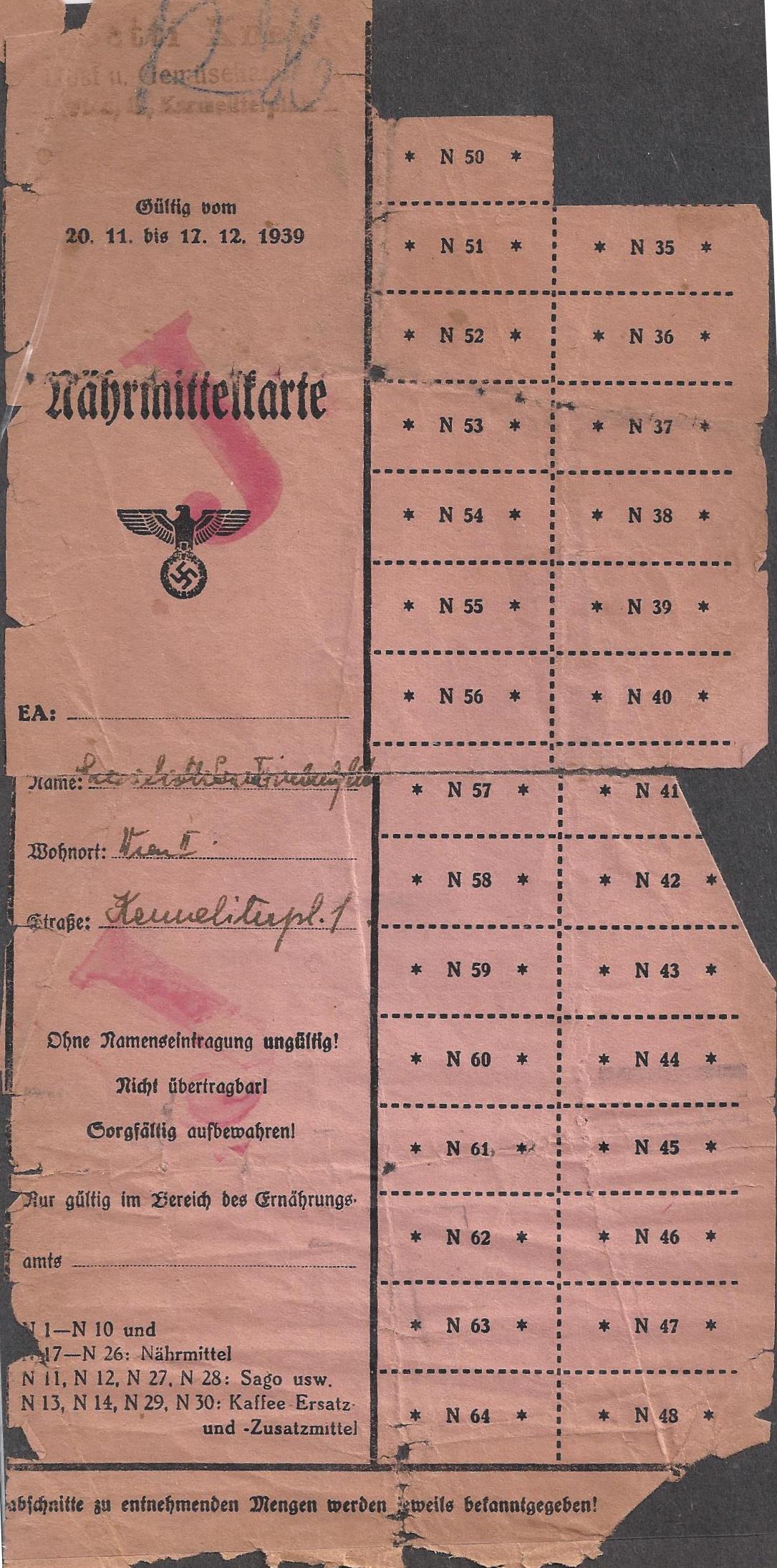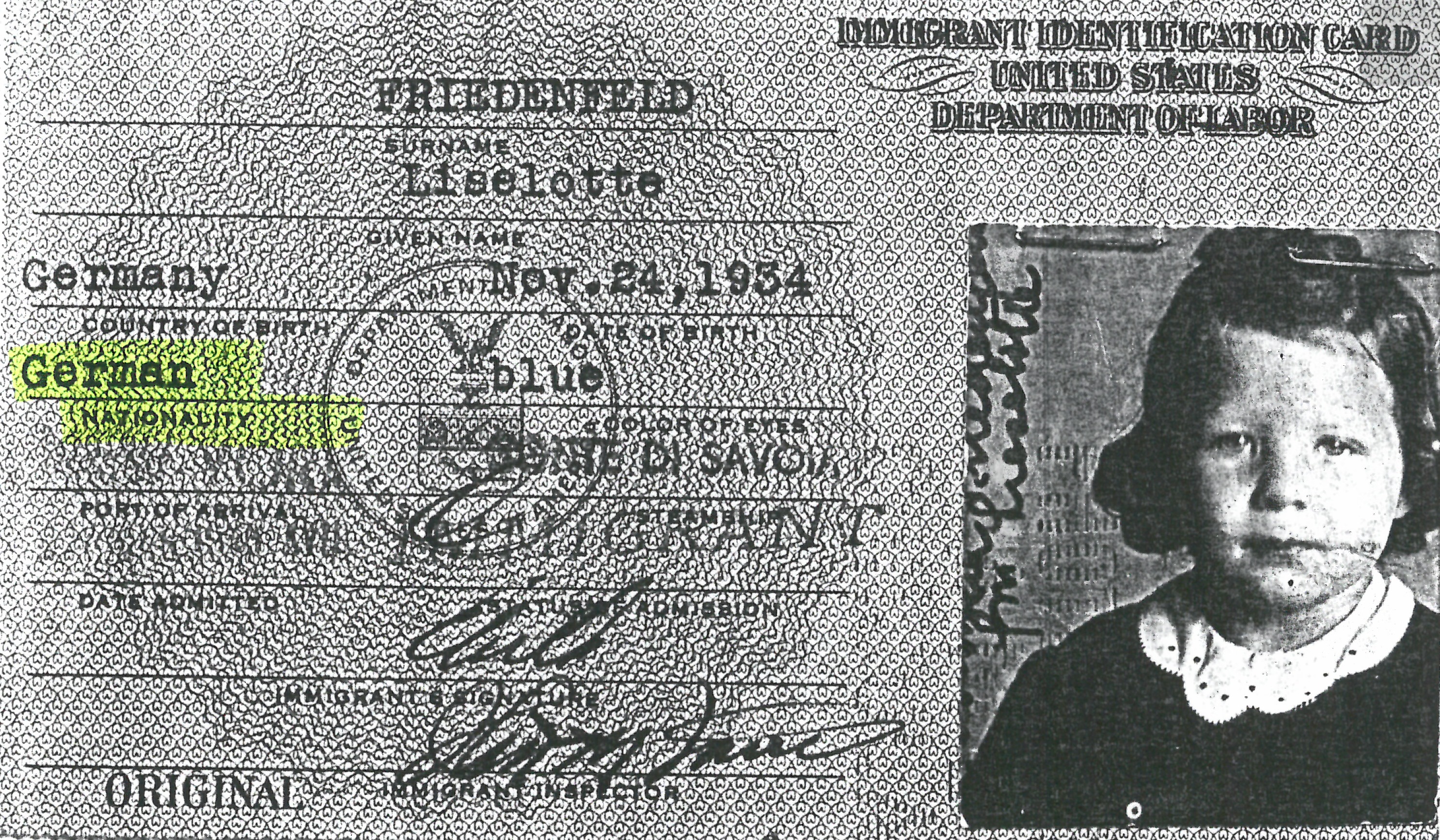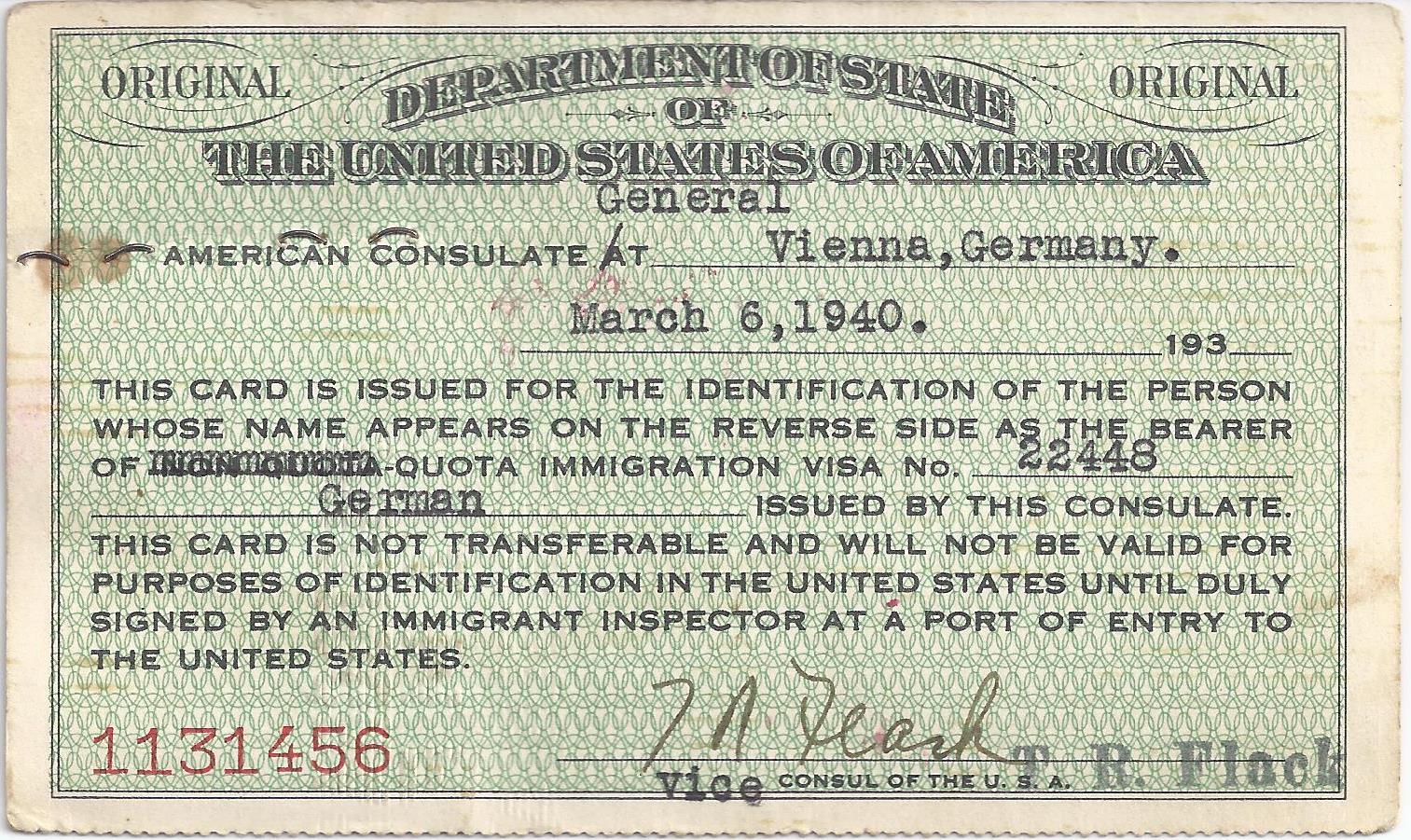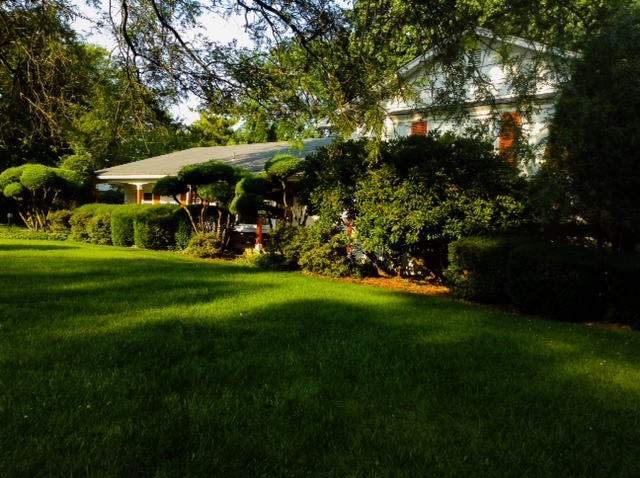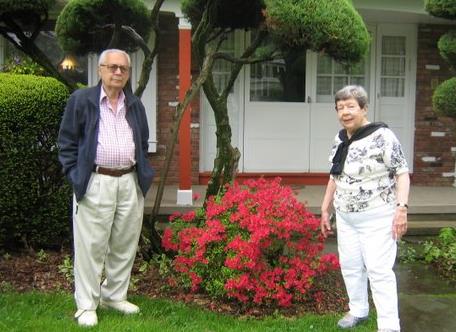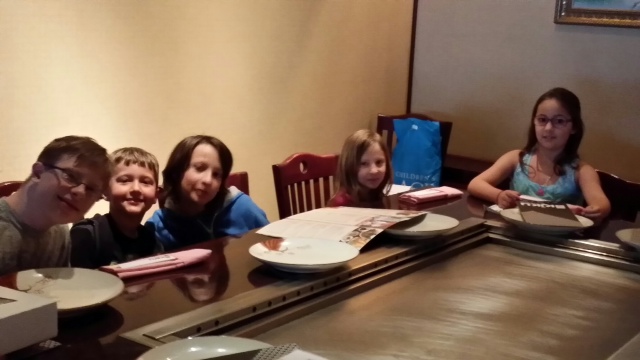Lisa Salz
Liesl's Journey to America
Lisa Salz was born in Vienna on 24 November 1934. She managed to escape to the USA with her mother. Her father, who had been arrested in Berlin for attempting to smuggle cash out of the country, wasn’t able to follow them to the USA until later. Her brother was given the chance to escape to Great Britain on a transport arranged by the Quakers. Lisa Salz has been living in the USA ever since.
The world-wide depression of the 1930s ruined my grandfather's fur business. My father worked for my grandfather and so they were both out of work. My parents and brother moved from their apartment to the large luxurious apartment of my grandparents. The apartment had been in the family since the building had been built in 1905. In 1934 I was born. As it was a very large apartment there were a few servants to help out. I remember the big Delft [1] tiled stove in the salon which heated the apartment, it always fascinated me for the stories it told. I also remember the big dining room table where we took our meals. Life was pleasant and comfortable for me. My mother's sister Zita also lived in the apartment, but I do not have any memories of her at that time. I was only three when she left for Argentina with her new husband. My father had convinced his friend's brother to marry her and leave in March of 1938.
And then came the “Anschluss” [2], when the Germans annexed Austria. Gone were the walks in the Stadtpark [3], gone was my scooter since, as Jews, we were not allowed such privileges. I was quite young still and many things come to mind but the sequence of events is difficult to organize. Suddenly everyone was leaving us.
My grandparents, my mother's parents, left for Romania to get away from the Nazi regime before the “Anschluss”. They had been monarchists, and my grandfather had been a major in the Emperor's cavalry. He had converted the family to the Evangelical religion in 1916 at the request of Franz Joseph [4], as he did not want Jews in his army. My grandfather had gotten Romanian citizenship at some time after the First World War. My grandparents spent the war years safely in Bucharest. My grandmother did not leave their apartment for three years. She spent most days converting old linens into table covers with beautiful needle work.
Martin, my brother, six years my senior, who was my friend and protector, was the next to go. He went to England, with a group organized by the Quakers [5], where he went to a boarding school. We would not see each other for seven years. My cousins Kitty and Betty left also. This was now March 1938.
That summer we could not go to a hotel or on any vacation and we went to Mayerling [6] to a convent which offered to house us. We stayed a week or so, my parents and a friend of the family, a Mr. Fried, and I. The sisters took care of me and I think I had a good time. When we were leaving one sister gave me a medallion with Mary on it and she told me to keep it and it will keep me safe.
Then my father was arrested with Mr. Fried and taken to Berlin. And now it was just my mother and I left in the apartment. But we had to take in strangers to live with us. A lady with two children of her friend, which she had somehow saved. They were very quiet little girls. I wonder sometimes what happened to them.
My mother was picked up by the Gestapo [7] almost on a daily basis and taken to headquarters and questioned on the whereabouts of my father who was in a German prison, apparently the Gestapo did not communicate with the police. My father's crime was trying to get some money out of Austria and to Paris. A gentleman who was going to Paris took the money. He had a notebook, in which he noted the names of the people and the money they had given him. He was caught on the train, arrested and the people in the notebook were picked up. Before my father was arrested he stopped in to see his mother, who had been required to take people in as well. Big apartments were taken over by the Nazis and people were left homeless. My grandmother's friend had moved in and then her nephew, who had just returned from Dachau concentration camp [8]. Heinrich Oppenheim was due to leave for the United States within months with his son, who had pestered the Gestapo to release his father as he had gotten all the papers together for their departure. He was all of 16 years old. My father asked Heinrich to look after my mother and me when we got to the States. Apparently the arrangements to go to the States had been made.
While this was all going on, I lived a somewhat normal life of a four year old. My Kinderfrau [9] took care of me until we could no longer afford her and then one of the maids, Millie, took care of me. My mother was getting our visas and papers in order and paying the endless fines the Gestapo demanded. Millie would take me to church with her which was across the street from us on Karmeliterplatz [10]. I would stare at the dead Saint that was laid out under glass.
I never told anyone about this: One day Millie said we are going somewhere special. We walked and then came to the Praterstraße [11]. People were all around us and we were pushed forward by the throng. Finally I was just behind a police man. I was scared I remember. He turned around, saw me, cute, blond, blue eyed, and picked me up and put me on his shoulders. Shortly, there were people marching down the street and drums playing a cadence. Then a car with some men. It was Hitler. On the way home I was made to swear I would never tell a soul about what I had seen.
We had no food as the store keepers were not allowed to sell food to Jews. We had ration cards for basic foods. I loved green peas and my mother would beg the green grocer for some, he gave us rotten ones, with a few good ones thrown in. Restaurants were off limit for Jews. However, we could go to coffee houses. So I was taken quite regularly for a Cremeschnitte [12]. As I really loved them it was a great treat. The fat and sugar of course were not good for my body or teeth.
Millie was a real Nazi I was told much later by my mother. She liked me very much but kept my mother under constant threat of being reported to the Gestapo. We could not fire her and had to continue paying her though she did very little in the household.
One day we had been on the street and the air raid sirens went off. We got to our house and went up quickly. Being a child I went to the window to see what was going on, I was careful and peeked out. I saw a policeman and heard him yelling at someone. It was one of the women who lived in our building and her dachshund. Apparently the dog was not moving fast enough and so the police man shot the dog. The woman shrieked and finally I heard the house door bang closed ... that wood door is still there today ... I could hear her screams up on the fifth floor. Finally a kind shop owner came out and covered the poor dog in the middle of the street. Then someone came and pulled me away.
We were supposed to leave for the States in November or December 1939. I got the mumps [13]. My mother had to go to Berlin to the prison to have my father sign papers so that we could leave at a later date. I was alone. I was sick. I was very unhappy. But as soon as I was better I had to go for a smallpox [14] vaccination. Doctors were not allowed to sterilize the needles they used on Jews. I got a very bad infection. My mother thought I would die. But in early March 1940 we were ready to go, first to Italy by train, and then by ship to New York. My grandmother, my father's mother, came to the station and put a bracelet on my arm ... metal with a ceramic picture. I will always keep that bracelet. All other jewelry had long been surrendered to the Gestapo. My mother could not even keep her wedding band.
We left on the train and I was still feverish and sat on my mother's lap. Next to us sat a lady with a basket on her lap. She told us she was part of a circus group who worked with alligators. She opened her basket and showed me her baby alligator.
We stayed only a few nights in Genoa, Italy before boarding the ship. As it was March the sea was very rough. Everyone on the ship was sea sick. I was not. I roamed around the ship by myself and went to the dining room where they brought me lots of olives to eat. I do not remember eating anything else.
One day on the ship I was wandering about and met the lady who had been on the train with us. She asked if I would like to see her large alligators. So I said yes. She took me down into the hold of the ship and it was rather large and empty. The stairs were scary because you could see through them as they were made of metal pieces and they were very high. I made it down and stood in front of a big grey box, and there were also large bags that moved. I was told their snakes were in the bags. I got a bit scared now, and then she opened the large grey box and an alligator's snout opened wide and I thought it could have swallowed me right then. I think I started to cry and I was promptly ushered back upstairs.
Some days later we arrived in New York. Everyone was on the top deck, great excitement as we passed the Statue of Liberty and sailed up the Hudson River where I watched cars moving just an even distance from each other and I asked, "Are they all attached to each other?" I had never seen so many cars.
We were taken to Congress House which was a small facility operated by Temple Emanu-El, the largest Jewish congregation in New York. [15] The chief rabbi was Stephen S. Wise. [16] I mention this because he met my mother and asked her if he could adopt me. We met quite a few nice people at Congress House. My mother made friends with a lady who had been on the St. Louis [17], and she had jumped into the water in Cuba when the passengers were told they are going back to Germany. She swam to shore and was saved, eventually coming to the United States. We stayed friends with Edith Hirschman until a few years ago. She was hired by Lilly Daché [18], an internationally known milliner from Paris, to work in the sample room making hats, and she got my mother a job there too. And so my mother launched a career in hats.
Now there was the question what was to be done with me. There was a wonderful woman, Trude Frank, who had gone back to Vienna, risking her life, a few times, to bring a few hundred children from Vienna to the United States. Homes all over the United States were found for these children. Trude then started a child care center in a hotel room first, which I attended, and later in a brownstone house on West End Avenue and 80th Street. The school eventually became quite large and had children of all ages. A summer camp was added in the summer. It was in the after school program and at the camp that I met some of my best friends. We talk often about those days at the Children's Colony. Trude was a remarkable woman. When I was sick she would sometimes come at lunch time and bring me soup. My mother could not stay home as she might lose her job.
We moved from Congress House after a few weeks to a rooming house in 62nd Street where Heinrich Oppenheim and his son Herbert lived. As the summer approached it was decided that we should go away for the summer. Somehow my mother and Heinrich and Herbert were hired to help a gentlemen farmer in Vermont grow vegetables and my mother was to cook. Frankly she did not cook very well, but there were some things she did quite well.
Before we left, Heinrich Oppenheim changed his name to Henry Owens. He was still of draft age and knew if he ever was shipped over to Europe the Nazis would surely kill him. Owens is however an Irish name, he got it from a coal truck that passed the house on 62nd Street.
The summer in Vermont helped us all with the trauma we had gone through.
We came back to the city and I was to have my tonsils removed. I was also to start first grade in school. I was taken to a well-known hospital, but as preparation I had my temperature taken and I had a fever and as they could not figure out what was wrong with me they kept me in isolation for two weeks. I suppose it was an after effect of my infection the previous winter. It was a bad experience for me as I could not see my mother often and then only through a glass window. Finally I was released and started school and shortly thereafter I was again taken to the hospital for the removal of the tonsils. Again it was a bad experience, waking up at night with pain in my throat and hungry.
But that too passed and I was back at school and afternoons were spent at the Children's Colony. We had a big woodwork room where I learned to use a saw and screw drivers and made a variety of wooden objects like a Christmas tree with hooks for keys. This knowledge has come in mighty handy. The boys were taught knitting. Trude Frank believed in non-gender education in the Rudolf Steiner [19] tradition. Because I had missed so much school I had to repeat first grade in January. But the rest of the year was mostly smooth. I finally was speaking fluent English as I was told not to speak German. My mother changed jobs but always did better and we muddled through. There was not always a lot of food. One night Edith Hirschman came to visit and my mother had very little food so she made bread dumplings with raspberry syrup. Edith teased my mother about that for the next thirty-five years.
By this time we had moved to 82nd Street and Broadway. It was a large apartment with many people in the various bedrooms, all sharing one kitchen and bath. This was very different from the home we had had in Vienna. Cooking was also not very easy. After my tonsil operation I did not want to eat. Mother pleaded with me. One evening the Hungarian couple down the hall offered me some steak, it smelled very good, and I ate and I ate. There was great excitement afterwards and I started to eat again. Henry Owens and his son Herbert lived in the same apartment, as did a cousin of theirs and a young mother with her son. Herb had met a lovely Viennese girl in night school and they were dating. As they had very little money dating was confined to visiting or walking and sometimes they would take me down to the local frankfurter place and buy me a frankfurter. My favorite food. On the way home they tried to get me lost by going in a different direction, but I always found my way to our apartment house. They would laugh about my uncanny sense of direction. They were married in 1943 and later had three children.
In the spring 1941 we learned that my father would be released in a short while and we must send money for his trip to the States. Somehow through cousins and friends the money was assembled. There had been a trial in Berlin and Mr. Fried had taken the blame for the money that was to go to Paris and the judge freed my father. Mr. Fried was single, in love with my mother for years, as I found out much later.
So it is a little like a Dumas [20] tale that freed my father. My father was on the train to Spain to catch the boat, and the train was forced to go on to Lisbon, Portugal. They wired us that there was an additional charge for the ship from Lisbon. We did not have a penny left. Henry had an idea, it was Advent Day [21] in Europe, but not in the United States, so he wired that it was a bank holiday and the money would be sent the next day or that Monday ... In the meanwhile my dad got on the ship with the telegram in hand and was allowed to sail. PS: the money was never sent.
Before leaving, my dad had visited his mother to say goodbye. It was some months later that she had to move into a room on the other side of town and from there was transported to the east. She was listed on a transport document which was just released some years ago. We believe she had died in Theresienstadt Ghetto camp [22]. Her daughter, my aunt, had tried to take her to Bratislava [23] where she was living with her husband who was a bridge engineer who was being used by the Nazi regime and was thus protected. He subsequently used people who were to be sent to concentration camps to help build bridges and thus he somehow saved many men.
My father stayed with us a very short time after he arrived. He went to a recovery home run by the Quakers in Nyack, New York. This was a large mansion which was converted into dormitories for men and women. They got good meals and were cared for by staff. I was sent there to spend some time with my father. They had a big dog on the property and he became my companion. It was a beautiful place overlooking the Hudson River about 20 miles north of New York City. We now were in the fall of 1941. I went back to PS 9 [24] on 82nd Street and finished first grade.
My grandmother's brother Joseph had come to the States and lived in Philadelphia. In 1939 my father's cousin Edith was travelling in Europe and my father introduced her to my uncle Joe. He convinced her to take him to England and marry him so that he could get to the United States. And so it was. My uncle was a bit of a gadfly, but he had also been in Buchenwald [25] after “Kristallnacht” [26]. Uncle Joe went with Aunt Edith and got married and lo and behold the middle aged bachelor fell in love with the middle aged spinster. Theirs was a most happy marriage. They came to see us shortly after our arrival and then we visited them in Philadelphia. Once I was sent to Philadelphia by myself on the train. Henry took me down to Penn Station and he was told I could only travel in the club car as I was not six years old yet. So here I was in a big swivel lounge chair going to Philadelphia. By this time my mother and Henry had become a pair. I enjoyed my aunt Edith and she enjoyed me too. She had her mother, Grampsie, living with her and she was a wonderful lady. I spend a lot of time with this family over the years and those were some of my best memories. Under their guidance I matured. They were very turned into me.
Pearl Harbor [27] brought the United States into the war. It was a frightening time. We received letters every now and then from my brother in school in England. They now came less often. Henry finally got a good job in an artificial flower factory designing new flowers and packaging for perfume companies. Things were looking better for us. My father had found a home with an old friend and his wife in Weehawken, New Jersey. They had a little daughter. I would be put on the ferry in New York and cross the Hudson to be picked up by my father on the other side in Weehawken, New Jersey.
As the summer of 1942 approached my mother and Henry decided to rent an apartment in the outskirts of the city. By this time Herb had been drafted into the army. The apartment was in a small house and the top floor was occupied by Henry's old friends from Vienna and their daughter Anni. We had a great summer. Ann was four years older than I but we became friends. I learned to roller-skate on the street, and in the long evenings of summer Henry, Ann and I played hide and seek. One evening Ann could not find Henry. She looked all over, he had climbed a tree and she stood underneath, saying, “I know he is right here.” We had a good laugh when she gave up. By late summer we found an apartment right across the street in a large apartment house. We had a German couple to each side of us and it was very pleasant living there. Mother and Henry made friends and life was good. I was in school, and on weekends often went to visit with my father in New Jersey. I now would take a bus rather than the ferry. My father met a very nice lady named Tilly, also from Vienna. It was in February of 1943 that Henry married my mother, and some months later my father married Tilly.
My parents did not speak to each other and I had to pass messages between them. It was most unpleasant for me. My mother did not work for a while. During the summer of 1944 we knew the war was ending. We went for a week's vacation to Upstate New York. My father and Tilly stayed at one hotel and we at another.
There were big discussions about my brother and his coming to the United States to join us. Well, it took almost a year for that to happen. Martin left England in May of 1945. This was just after the war ended in Europe. He came on a large ship but we were not certain he had come on that particular boat as there were no passenger lists, probably because of security issues. I was very excited. Everyone seemed to have come off the ship after a while. Mother and Henry were ready to leave and I pleaded to wait just a while longer. And then I saw this young man slowly walking towards us and I know it was my brother. I still cry with joy when I relate this story. Well, it was wonderful for my mother and me to have my brother again. Henry took to him right away and they were good friends.
Martin was enrolled in a private school for the summer to learn American History so that he could pass the regents exams which are like the European high school exam or Matura [28].
We rented a half of a house in Long Branch, New Jersey. The house had once been the summer "cottage" of Theodore Roosevelt [29]. It was on a large beach and we enjoyed our stay. Henry bought our first car, a Model T Ford. It was a great buggy. Henry and Martin took the train to Manhattan. Mom and I stayed at the beach house.
I had some trouble adjusting to sharing my mother's attention with my brother. But adjust I did. Slowly Martin's friends began arriving from England and I became everyone's little sister. I was taken along to concerts and plays and parties. I even participated in my first Seder [30] at the home of John Goldmeier's [31] uncle. I did not have a religious upbringing. My brother finished his high school and then applied to Queens College [32] to study Psychology.
My grandparents living in Bucharest, Romania, wanted to come to the States as the Russians were taking over the country [33]. Well, when they arrived for a few months six of us lived in the small one bedroom apartment.
Herb was doing quite well by then, having returned from his tour of duty in Europe. He and a friend manufactured ball point pens which were quite the craze at the time. It was mostly assembling parts imported from Japan. My mother worked there too, getting the proper parts to the workers. With Herb's help we bought a small attached house in Forest Hills, New York. My grandmother cooked, my grandfather went into business with an old friend, and life continued.
Martin graduated from Queens College and went to Cleveland to Western Case [34] for a master in Industrial Psychology. He joined the Air Force Reserve Training Program. So my brother and I only spent five years under one roof after the war. We were good friends. I loved going to plays and concerts and to the beach, acting the little sister to his friends.
We saw our father almost every week. His diabetes got worse. During his imprisonment in Berlin the Germans did experiments on him by giving him only cauliflower to eat. When he arrived in America he had been free of diabetes. Now it was on the rampage. First he got gangrene on a toe and that was removed. Then his leg up to the knee was removed. As we did not have money for private nurses I would go every afternoon to the hospital about an hour from home to take care of him. Mostly I would feed him and sit with him until his wife would come at six or so. Things were difficult for everyone. My grandfather had a heart attack and we had to move from the house to an apartment. I had graduated high school and was at Queens College. Henry had lost his job as artificial flowers were out of fashion and went into business with my mother making bridal hats and bridesmaids’ hats. I would come home and help my mother sew the hats at night.
I finally quit college for a year and later returned, going to night school. It took me nine years to get my degree, but I did. The night of graduation was one of the first New York City blackouts. What a mess. We had hoped to eat at a Czech restaurant but it was not to be.
By this time I was already working at Swissair as a reservations agent. My father had been most brave and courageous after losing his leg. He had an artificial limb and got around very well. He had a mild stroke but went to work every day until at one point it got a bit too much for him. He asked me to get him a ticket to Munich to visit his broker to buy new stones for the semi-precious jewelry trade which was the business he was in. I was going to meet him in Vienna and then spend a few days in Paris. He had kidney failure while in Germany. I flew out right away but it took a long time to fly over at the time, no jets yet. And then I had to take a train to Kaufbeuren [35] to the hospital to which he had been taken. He died a few hours after my arrival. They had to build a coffin and I was able to take him to Zurich and then Swissair flew him home. It was a very sad trip, but also a beautiful one across the Bodensee [36]. I was glad to have him with me on the trip.
About five years later I was introduced to a young man born in Austria, but had lived in Carlsbad [37], Czechoslovakia. He had spent the war in Russia fleeing with his parents as the Germans came ever closer. He was caught one day with his parents and had to sit for hours with a soldier holding a machine gun on them, threatening them if they moved. Then suddenly they were released. He finally ended up in the trenches with his father, fighting with the Czech army in retreat. His mother died of diphtheria in a refugee camp in Russia.
We were married in November 1963. We lived near my mother and his father. We were both very protective of our parents. In time we had two sons and the apartment was not big enough. My husband Bert worked for many years in New Jersey which was a real long trip each day. So we decided to move to New Jersey. We have now been living here for forty years. Our sons have five children between them and we consider ourselves very lucky to have lived and see our grandchildren.
We may have left Austria but even our grandchildren love Palatschinken [38] and Schlag [39], Wiener Schnitzel [40] and chicken soup. And so the Austrian traditions survive in our family.
[1] Delft: a city in the Netherlands, known for its pottery (“Delftware”).
[2] The "Anschluss" refers to the annexation of Austria and its integration into the German Reich on 13 March 1938.
[3] Public park in Vienna situated between Parkring in the 1st District and Heumarkt in the 3rd District.
[4] Franz Joseph I (1830–1916), Emperor of Austria.
[5] Quakers or "Society of Friends": a religious community that originated in 17th century England and that supported many Jews during and after the Second World War within the scope of various relief projects.
[6] Hunting lodge of Crown Prince Rudolf of Austria (1858–1889) who committed suicide there with his mistress, Baroness Mary Vetsera, in 1889. Emperor Franz Joseph I subsequently converted the building into a convent.
[7] Abbreviation of Geheime Staatspolizei (“Secret State Police”), Nazi Germany’s secret police.
[8] As one of the first Nazi concentration camps, this camp near the Bavarian city of Dachau opened in March 1933, originally intended to hold political prisoners. Until its liberation by the US Army in April 1945, more than 200,000 prisoners went through Dachau concentration camp, and more than 40,000 were murdered there.
[9] Nanny.
[10] A square in the 2nd District of Vienna.
[11] Street in the 2nd District of Vienna that connects the city center with the Viennese Prater, a huge park with rich pastures.
[12] Slice of cream cake.
[13] Viral disease, a common childhood disease at that time.
[14] An infectious disease which has now been eradicated.
[15] Congress House, founded by Louise Waterman Wise (the wife of the New York rabbi Stephen S. Wise) to accommodate and cater for Jewish refugees who had fled the German Reich, was run by the American Jewish Congress, an association of Jewish Americans whose aims were to defend Jewish interests in the United States and abroad.
[16] Famous US American Reform rabbi and Zionist leader (1874–1949), among other things co-founder of the American Jewish Congress and chief rabbi of the „Free Synagogue“, a liberal Jewish congregation.
[17] A German liner that sailed to Cuba in 1939 with nearly 1,000 Jewish refugees on board. There they were denied entry, and the ship had to return to Europe where most of the refugees were accepted by various countries.
[18] Lilly Daché (1898–1989), famous French milliner and fashion designer in the USA.
[19] Rudolf Steiner (1861–1925), Austrian philosopher, founder of the so called Waldorf pedagogics, a progressive educational movement.
[20] Alexandre Dumas (1802–1870), one of the most widely read French authors (“The Three Musketeers”, “The Count of Monte Cristo”).
[21] Meant is probably the Feast of Corpus Christi.
[22] Czech: Terezín, a small town about 60 km north of the Czech capital Prague that in 1941 was converted into a Ghetto and concentration camp especially for Czech and mostly older German and Austrian Jews. More than 140,000 people were sent to this camp; around 35,000 died there due to the inhuman living conditions, about 87,000 were sent on to the extermination camps in Eastern Europe.
[23] Capital of Slovakia.
[24] Public School number 9, today home of the Mickey Mantle School, serving children with disabilities.
[25] Buchenwald concentration camp near Weimar in Thuringia was the largest Nazi concentration camp. About 56,000 of roughly 250,000 prisoners did not survive the camp.
[26] The “Kristallnacht” or “Reichskristallnacht” is the Nazi term for the anti-Jewish pogroms which took place throughout the German Reich on 9/10 November 1938. Its name, “The Night of Broken Glass”, refers to the many windows and shop fronts which were destroyed during that night. In addition to the looting, destruction and confiscation of Jewish businesses, apartments, synagogues and prayer houses, thousands of Jews were arrested. Some were deported to concentration camps, where many of them were murdered.
[27] The Japanese attack on US naval base Pearl Harbor, Hawaii on 7th December 1941 led to the entry of the USA into World War II.
[28] Latin name for the high school exit exam in various European countries.
[29] Theodore Roosevelt (1858–1919), American politician, 26th President of the United States (1901–1909).
[30] Seder: a Jewish ritual feast marking the beginning of the Jewish holiday of Passover (or Pesach), which commemorates the liberation of the Jewish people from slavery in ancient Egypt.
[31] John Goldmeier was a friend of Lisa Salz’s brother.
[32] One of the senior colleges of the City University of New York.
[33] Meant is the coming to power of the Romanian communists in 1946.
[34] Today’s Case Western Reserve University, a private research university.
[35] Town in Bavaria, Germany.
[36] English: Lake Constance, one of the largest lakes in Central Europe with shorelines in Germany, Switzerland and Austria.
[37] Czech: Karlovy Vary, a town in western Bohemia.
[38] Pancakes.
[39] Whipped cream.
[40] Viennese Schnitzel: breadcrumbed and fried veal escalope.


